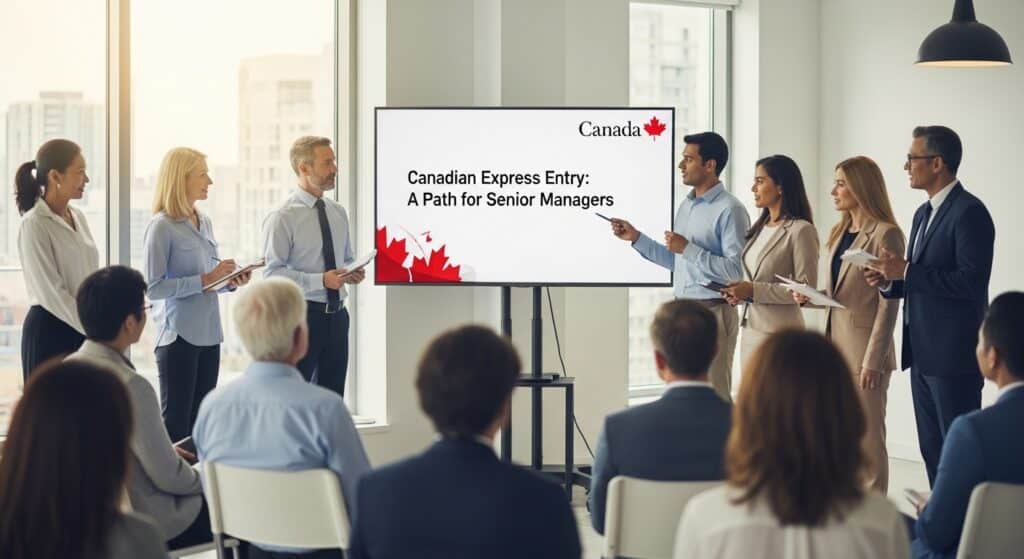Today we want to share with you a story of a refusal. Yes, we usually like publishing stories of success, but the truth is that in 12%-20% of cases, we do receive a negative decision from the IRCC. While we love celebrating our clients’ successes in their business immigration journeys, we sometimes also deal with very bitter disappointments when the IRCC decides (fairly or unfairly) to reject our clients’ applications. Unfortunately, rejections are unavoidable, and no matter how much we try to avoid them, there always will be rejections simply because there is no such thing as 100% success in immigration.
Our story is about Ms. N.K., who recently got refused a work permit to enter Canada to establish her business. Ms. N.K. is a citizen of the Dominican Republic who has been residing in the UAE. She is the founder and CEO of a very successful engineering service company. Her UAE-based engineering service company specializes in providing comprehensive engineering and smart solutions to operators in the GCC region’s industrial energy and manufacturing sectors. In 2019, Ms. N.K. registered her company’s subsidiary office in Canada to respond to the emerging demand from USA-based customers. Shortly after, she put her expansion plans on hold and focused on further growing her company in the GCC region.

Her company generated around CAD $6 million in revenue in the past year and had around CAD $10 million in liquid funds to support Canadian expansion plans. Ms. N.K. pledged to employ at least 4 Canadians in the first 2 years of her business in Canada with a gross yearly payroll of over CAD $300,000. She had already transferred around CAD $230,000 in initial seed capital to fund her Canadian company’s operational costs in the first year.
In addition, Ms. N.K. is an outstanding leader and entrepreneur in her own right. With a degree in a highly specialized discipline from a prominent university, she has also earned various international awards and recognitions for leadership, entrepreneurship, and building notable businesses. As we are sure you can see, Ms. N.K. had a solid and well-supported case and a genuine intention to work and build her business in Canada.
Unfortunately, a few days ago, her application for a Canadian visa to join her Canadian company as a Chief Operating Officer was refused on the following grounds:
-
insufficient evidence the R205(a): C12 significant benefits requirements are met; and
-
insufficient evidence of a qualifying business relationship.

Needless to say, we were shocked and disappointed to receive a negative decision for Ms. N.K. What a loss for Canada, indeed! Both reasons provided for the rejection are unreasonable in our view, given the ample evidence we had included in the application package about the qualifying business relationship and the significant benefits to Canada (although significant benefits are not legally required for ICT/C12 applications). We disagree with the IRCC’s decision and intend to take the following steps to turn this negative decision into a success story. The immigration officer’s assessment did not fully consider the extensive documentation provided. Additionally, it is crucial to ensure that no false or misleading information was included in the application to avoid misrepresentation issues.
-
Step 1: Within 10 days, request for a reconsideration of the negative decision from the IRCC. In our experience, around 30% of rejections are reconsidered and get approved.
-
Step 2: Apply and receive Officer’s notes under the ATIP provisions. It takes between 3—60 days to get the Officer’s notes.
-
Step 3: If step 1 is unsuccessful, re-submit the application with explanations and new evidence based on ATIP notes. 73% of cases get approved on the second try.
-
Step 4: If step 3 is unsuccessful, request the Federal Court to judicially review the application and try to settle with the IRCC’s counsel before litigation. Around 25% of cases are successful at the Federal Court level.

It is regrettable and unfortunate that we must go through some of these steps with Ms. N.K., but certain things are beyond our control. While we have limited control over how the IRCC officers assess and interpret the evidence we provide, we can control our response to such assessment. In cases like Ms. N.K.’s, we always choose to push back and request the IRCC officers to re-assess the application and explain why our position is incorrect.
For Ms. N.K., we are determined to do just that – continue our relentless advocacy and use all our knowledge and expertise to get results for Ms. N.K. and her company. We hope to share the good news with you about this case very soon.
Things to Keep in Mind for Visitor Visa Application

IRCC officers are human beings, and as immigration authorities, they are doing their best to make fair and reasonable decisions. Sometimes, due to several different factors, they make mistakes, as all humans do. That’s why it is important to try again.
IRCC is increasingly using AI tools to improve the speed of application processing. Their AI tool (called Chinook) is not perfect and is “learning” how to make good decisions. We sometimes get approvals from Chinook for applications that a human IRCC officer would probably reject. Understanding Canadian immigration regulations and processes is crucial to navigate these complexities effectively. However, we also get unreasonable rejections made by it just the same.
Many decisions in immigration law are discretionary – which means that the IRCC officers have a right to reject any application as long as their rejection is reasonable. However, reasonableness is a very vague standard, and what may seem reasonable for one person may not be reasonable for another person. Therefore, it is “normal” that the IRCC decisions are not always consistent: 2 different officers may view the same application and come to opposite conclusions, and both could be reasonable and thus right.
Lastly, we have to admit that we are humans, too. Though it happens rarely, we also make mistakes, and this “human effect” is unavoidable, no matter how hard we try. However, because we know that we are not perfect, we’ve built systems to fight our mistake-prone human nature. Specifically:
When mistakes happen, we take full responsibility for our mistakes and relentlessly work to push our clients’ interests forward (at no cost to them, of course!).
Each application at our firm gets reviewed at least by 4 different people (for mistakes and “reasonableness”).
We do “after-failure” reviews with the entire team, carefully study each rejection and the corresponding ATIP notes and immediately implement changes in our systems and internal protocols to avoid this mistake.
We do regular training on “what we learned from the mistakes & ATIP notes” for the entire team.
Common Reasons for Visa Refusals

Below, you will find the list of the most common refusal reasons that the IRCC has given us in the past 6 months:
Factors such as health status and misrepresentation can significantly impact a visitor visa application.
The classification of the visa, whether a temporary resident visa, like a visitor or student permit, can affect the options available after a rejection.
Entrepreneur Stream for Canadian Immigration
“You were not able to demonstrate that you will be able to adequately perform the work you seek.”
“You did not provide a valid Labour Market Impact Assessment (LMIA) from the Department of Employment and Social Development Canada (ESDC).”
“You have not demonstrated that you come within the exceptions of R205(a) and that the proposed work in Canada would create or maintain significant social, cultural or economic benefits or opportunities for Canadian citizens or permanent residents.”
“Insufficient evidence the C11 Entrepreneur/Self-Employed OR the C10 Significant Benefits requirements have been met.”
“You have not demonstrated that you meet the eligibility requirements of the C11 category under R205(a); sufficient evidence of ownership and measures taken to put the business plan in action have not been provided.” The visa officer may refuse applications based on insufficient ties to the applicant’s home country, failure to provide adequate documentation, or other concerns surrounding the applicant’s intent and eligibility.
“The purpose of your visitor visa to Canada is not consistent with a temporary stay, given the details you have provided in your application.”
ICTs and Immigration Authorities
“You have not demonstrated that your employer has realistic plans to staff the new operation and/or the financial ability to commence business in Canada and that the Canadian and foreign enterprises are legal entities that have a qualifying relationship.”
“You have not demonstrated that you come within the exceptions under section 186 of the IRPR exempting you from the requirement to obtain a work permit or that your employment in Canada comes within the exceptions to section 203 of the IRPR. As a result, your offer of employment must be the subject of an economic effect determination before a work permit can be issued to you. Your employer in Canada should contact the local office of the Department of Employment and Social Development Canada to begin this process.”
“Bona fide requirements under the Intra-Company transferee stream not well demonstrated from the documents presented. Refused.” Immigration officers have new guidelines that allow for greater discretion in deciding visa duration and may refuse a visa based on an applicant’s perceived intent to leave Canada after their stay.
“Insufficient evidence the R205(a): C12 significant benefits requirements are met; insufficient evidence of a qualifying business relationship.”
“The purpose of your visit to Canada is not consistent with a temporary stay, given the details you have provided in your Canadian visitor visa application. You do not have significant family ties outside Canada. You have not sufficiently demonstrated that you meet the requirements of the exemption of significant benefit within the meaning described in section 205(a) of the Regulations.”
As you can see, refusals happen, and they happen for a wide variety of reasons, but they are no reason to get discouraged because the application life-cycle does not have to end there. With the right strategy, support and attention, approval can be possible.













